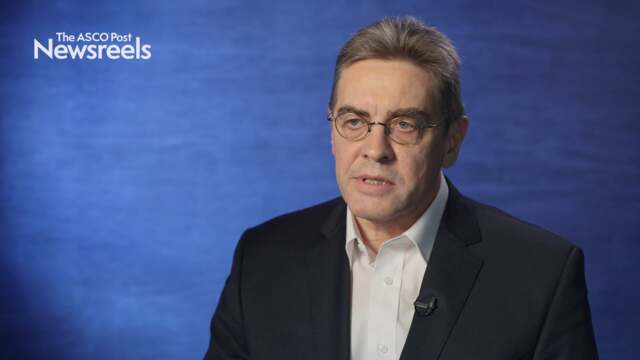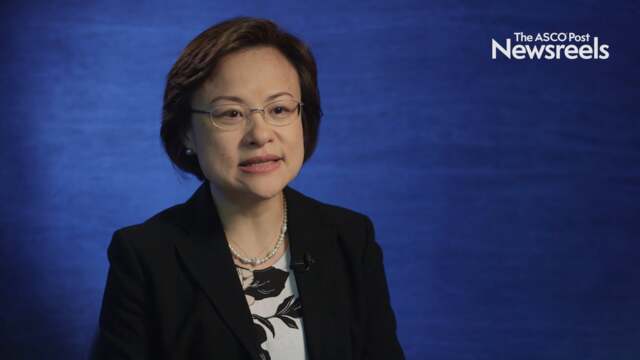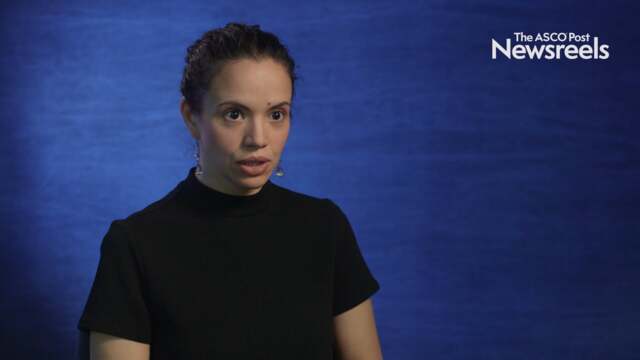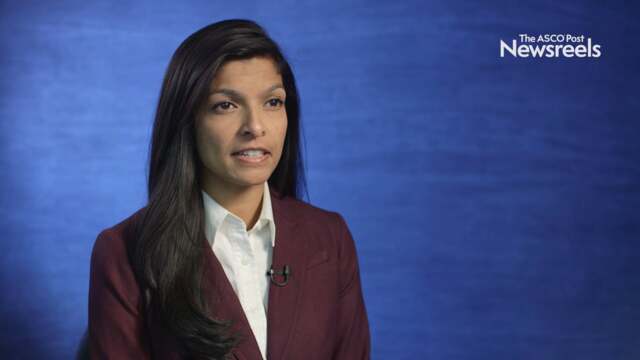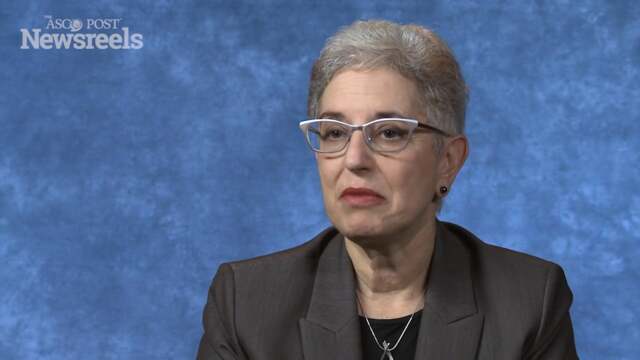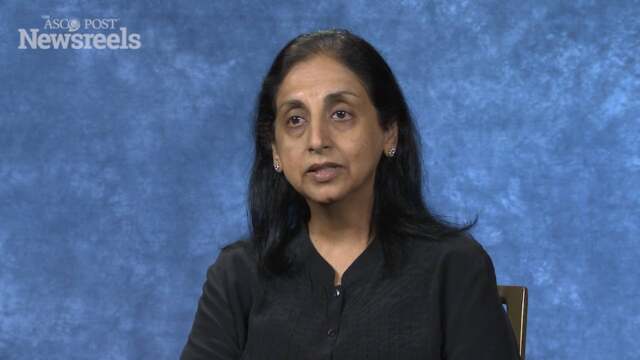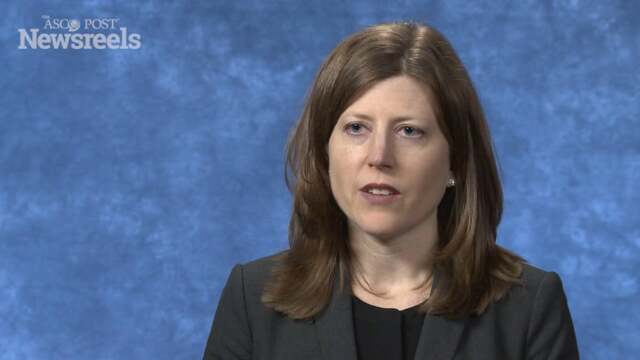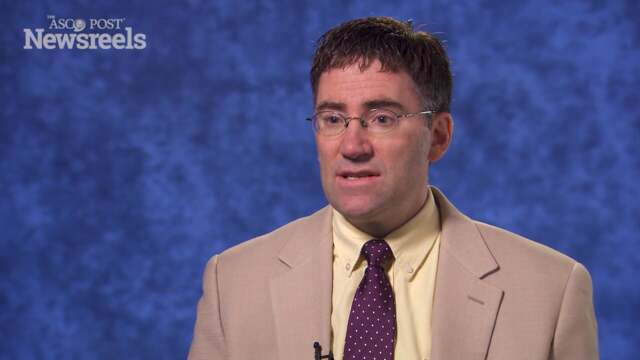Michael Unterhalt, MD, on Mantle Cell Lymphoma: Long-Term Follow-up Results
Michael Unterhalt, MD, of the University Hospital Grosshadern, discusses study findings on rituximab maintenance after first-line immunochemotherapy among older patients who are not candidates for autologous stem cell transplantation (Abstract 153).
ASH 2017: JULIET Trial: 6-Month Analysis of Tisagenlecleucel in Relapsed/Refractory DLBCL Shows Sustained Responses
Six months after receiving a single dose of tisagenlecleucel, a chimeric antigen receptor (CAR) T-cell therapy that targets CD-19, high response rates persist among adult patients with relapsed or refractory diffuse large B-cell lymphoma (DLBCL), according to findings reported by Schuster et al at...
ASH 2017: ZUMA-1: Responses to CAR T-Cell Therapy Still Strong After 1 Year in Patients With Refractory NHL
Among 108 patients with fast-growing and refractory aggressive non-Hodgkin lymphoma (NHL), more than half were still alive at least a year after receiving a single infusion of a CAR T-cell therapy called axicabtagene ciloleucel that targets the CD-19 protein frequently found on cancerous lymphoma...
Jia Ruan, MD, on Mantle Cell Lymphoma: Study Results on Lenalidomide and Rituximab
Jia Ruan, MD, of NewYork-Presbyterian/Weill Cornell Medical Center, discusses a 5-year follow-up analysis that showed lenalidomide and rituximab as initial treatment achieved a high rate of complete responses and MRD negativity with durable remissions beyond 4 years (Abstract 154).
Carla Casulo, MD, on Follicular Lymphoma: Results From the FLASH Study
Carla Casulo, MD, of the James P. Wilmot Cancer Center, discusses findings on POD24 as a robust early clinical endpoint of poor survival in follicular lymphoma, using data from more than 5,000 patients in 13 clinical trials (Abstract 412).
ASH 2017: Addition of Brentuximab Vedotin to Multidrug Regimen Reduces Risk of First-Line Treatment Failure in Advanced Hodgkin Lymphoma
Patients with advanced Hodgkin lymphoma (HL) who were treated with a multidrug regimen that included the targeted agent brentuximab vedotin (Adcetris) had a 23% reduction in the risk of disease progression, death, or the need for additional therapy, compared with patients who received the standard...
ASH 2017: Targeted Antibody Mogamulizumab Superior to Vorinostat for Previously Treated CTCL in Phase III Trial
In a large, international, randomized phase III trial presented by Kim et al at the 59th American Society of Hematology (ASH) Annual Meeting & Exposition (Abstract 817), patients with previously treated cutaneous T-cell lymphoma (CTCL) who received the investigational targeted drug...
Tanaya Shree, MD, PhD, on DLBCL Survivors: Long-Term Effects
Tanaya Shree, MD, PhD, of Stanford University Medical Center, discusses findings from a large population-based study suggesting lasting effects of lymphoma and its treatments: an increased incidence of autoimmune and infectious diseases (Abstract 198).
ASH 2017: Sustained Benefit With Ibrutinib in Relapsed or Refractory Mantle Cell Lymphoma
The results of a pooled analysis of patients with relapsed or refractory mantle cell lymphoma (MCL) treated with ibrutinib (Imbruvica) were presented at the 2017 American Society of Hematology (ASH) Annual Meeting & Exposition (Abstract 151). The extended follow-up data demonstrated that...
Watch for More From ASH 2017
Phase III ASPIRE Trial of Carfilzomib in Relapsed Multiple Myeloma Overall survival results from the phase III ASPIRE trial will be detailed for the first time in an oral presentation by Stewart et al on Monday, December 11. The addition of carfilzomib to lenalidomide and...
Acalabrutinib in Previously Treated Mantle Cell Lymphoma
On October 31, 2017, the Bruton’s tyrosine kinase (BTK) inhibitor acalabrutinib (Calquence) was granted accelerated approval for treatment of adult patients with mantle cell lymphoma who have received at least one prior therapy.1,2 Supporting Efficacy Data Approval was based on objective response...
Born in Chicago, Lymphoma Specialist Sonali M. Smith, MD, Never Left the Windy City
Nationally recognized lymphoma expert Sonali M. Smith, MD, was born and reared in Chicago to a mother who was a pediatrician and allergist, and a father who was an engineer. Her parents were first-generation immigrants from India who placed the value of education second to none. “I became used to...
Follicular Lymphoma: Is the Road to Cure Paved With Gallium?
The roadside along the path to curing follicular lymphoma is riddled with the debris of failed cytotoxic regimens. For decades, clinical trials unsuccessfully pitted various chemotherapy combinations against each other. It took but a single, noncytotoxic molecule, rituximab (Rituxan), to forever...
Obinutuzumab-Based First-Line Treatment Improves Progression-Free Survival vs Rituximab-Based Treatment in Follicular Lymphoma
In the phase III GALLIUM trial reported in The New England Journal of Medicine by Robert Marcus, MBBS, of University College London, and colleagues, obinutuzumab (Gazyva)-based therapy significantly prolonged progression-free survival vs rituximab (Rituxan)-based therapy in patients with previously ...
CAR T-Cell Therapy Makes Further Inroads in Lymphoma and Myeloma
With the recent U.S. Food and Drug Administration (FDA) approvals of two chimeric antigen receptor (CAR) T-cell products, this novel approach seems to be moving into the mainstream. The approvals were tisagenlecleucel (also known as CTL019; Kymriah) for the treatment of pediatric B-cell acute...
Patients With HIV-Associated Lymphoma Can Safely Continue Antiretroviral Therapy During Chemotherapy
Patients with human immunodeficiency virus (HIV) who are treated with combination antiretroviral therapy (cART) can safely undergo chemotherapy to treat associated lymphomas at the same time, researchers from the AIDS Malignancy Consortium have found. These findings were published by Tan et al in...
FDA Approvals in November 2017: Novel Drugs, New Indications
THE U.S. FOOD AND DRUG ADMINISTRATION (FDA) approved a number of novel drugs and new indications in November 2017. Several of them are listed here. Fulvestrant/Abemaciclib Combination in Breast Cancer ON NOVEMBER 15 , the FDA approved fulvestrant (Faslodex) in combination with abemaciclib...
Update on NCI-MATCH Precision Medicine Trial
THE NATIONAL CANCER INSTITUTE (NCI) Molecular Analysis for Therapy Choice (MATCH) clinical trial has achieved the goal of screening nearly 6,000 patients in just under 2 years, according to data presented at the 2017 American Association for Cancer Research–NCI–European Organisation for Research...
FDA Approves CAR T-Cell Therapy for Adults With Certain Types of Large B-Cell Lymphoma
ON OCTOBER 18, the U.S. Food and Drug Administration (FDA) approved axicabtagene ciloleucel (Yescarta), a cell-based gene therapy, to treat adult patients with certain types of large B-cell lymphoma who have not responded to or who have relapsed after at least two other kinds of treatment....
Copanlisib in Relapsed Follicular Lymphoma
On September 14, 2017, copanlisib (Aliqopa) was granted accelerated approval for treatment of adult patients with relapsed follicular lymphoma who have received at least two prior systemic therapies.1,2 Supporting Efficacy Data Approval was based on durable responses observed in a multicenter phase ...
Axicabtagene Ciloleucel for Large B-Cell Lymphoma
In the Clinic provides overviews of novel oncology agents, addressing indications, mechanisms of action, administration recommendations, safety profiles, and other essential information needed for the appropriate clinical use of these drugs. On October 18, 2017, the chimeric antigen receptor (CAR)...
New Options for the Management of Hodgkin Lymphoma
With the vast majority of patients cured with primary therapy, classical Hodgkin lymphoma is largely a success story. For the 10% to 20% of patients who either relapse or are refractory to front-line therapy, the disease can still be fatal. At the National Comprehensive Cancer Network® (NCCN®) 12th ...
Adding Antibody-Drug Conjugate to First-Line Treatment of Advanced Classical Hodgkin Lymphoma
As reported by Eichenauer et al in The Lancet Oncology, the final results of a phase II German Hodgkin Study Group trial showed similar efficacy but a better toxicity profile for BrECADD (brentuximab vedotin [Adcetris], etoposide, doxorubicin, cyclophosphamide, dacarbazine, dexamethasone) vs...
FDA Approves Obinutuzumab for Previously Untreated Advanced Follicular Lymphoma
On November 16, Genentech announced that the U.S. Food and Drug Administration (FDA) approved obinutuzumab (Gazyva) in combination with chemotherapy, followed by obinutuzumab alone in those who responded, for people with previously untreated advanced follicular lymphoma (stage II bulky, III, or...
Long-Term Results of First-Line Regimens in Advanced Symptomatic Follicular Lymphoma
Long-term results of the Italian phase III FOLL05 trial, reported by Luminari et al in the Journal of Clinical Oncology, indicate superior progression-free survival with R-CHOP (rituximab [Rituxan] plus cyclophosphamide, doxorubicin, vincristine, and prednisone) and R-FM (rituximab plus fludarabine ...
Association of Event-Free Survival at 24 Months With Overall Survival in Peripheral T-Cell Lymphoma
In a study reported in the Journal of Clinical Oncology, Maurer et al found that event-free survival at 24 months (EFS24) was associated with prolonged subsequent overall survival among patients with peripheral T-cell lymphoma (PTCL). Study Details The study involved patients with systemic PTCL...
FDA Approves Brentuximab Vedotin for Primary Cutaneous Anaplastic Large Cell Lymphoma
Today, the U.S. Food and Drug Administration (FDA) granted regular approval to brentuximab vedotin (Adcetris) for the treatment of adult patients with primary cutaneous anaplastic large cell lymphoma (pcALCL) or CD30-expressing mycosis fungoides who have received prior systemic therapy. ALCANZA...
Life After Treatment: Managing Lymphoma Survivors
According to Surveillance, Epidemiology, and End Results (SEER) data, patients with Hodgkin lymphoma and non-Hodgkin lymphoma (NHL) have 5-year survival rates of 86% and 71%, respectively.1 Although the increased number of survivors is welcome proof of the success of new treatment regimens, it also ...
FDA Approves Novel Therapies for Lymphoma Indications
IN OCTOBER, the U.S. Food and Drug Administration (FDA) approved two novel agents for lymphoma indications: -acalabrutinib (Calquence), a kinase inhibitor, for the treatment of adults with mantle cell lymphoma who have received at least one prior therapy; and axicabtagene ciloleucel (Yescarta), a...
Final Results of German Trial of PET-Guided Treatment in Advanced Hodgkin Lymphoma
Final results of the German Hodgkin Study Group phase III HD18 trial, reported in The Lancet by Borchmann et al, showed no benefit of adding rituximab (Rituxan) to escalated BEACOPP (eBEACOPP; bleomycin, etoposide, doxorubicin, cyclophosphamide, vincristine, procarbazine, and prednisone) in...
FDA Approves New Treatment for Adults With Mantle Cell Lymphoma
The U.S. Food and Drug Administration (FDA) today granted accelerated approval to acalabrutinib (Calquence) for the treatment of adults with mantle cell lymphoma who have received at least one prior therapy. “Mantle cell lymphoma is a particularly aggressive cancer,” said Richard...
FDA Approves Axicabtagene Ciloleucel for Large B-Cell Lymphoma
On October 18, 2017, the U.S. Food and Drug Administration (FDA) granted regular approval to axicabtagene ciloleucel (Yescarta) for the treatment of adult patients with relapsed or refractory large B-cell lymphoma after two or more lines of systemic therapy, including diffuse large B-cell lymphoma...
FDA Approves CAR T-Cell Therapy to Treat Adults With Certain Types of Large B-Cell Lymphoma
On October 18, the U.S. Food and Drug Administration (FDA) approved axicabtagene ciloleucel (Yescarta), a cell-based gene therapy, to treat adult patients with certain types of large B-cell lymphoma who have not responded to or who have relapsed after at least two other kinds of treatment....
PI3K Inhibition in Relapsed or Refractory Indolent Lymphoma
As reported in the Journal of Clinical Oncology by Dreyling et al, the phase II CHRONOS-1 trial has shown a high response rate and durable responses with the phosphatidylinositol 3-kinase (PI3K) inhibitor copanlisib (Aliqopa) in adults with relapsed or refractory indolent lymphoma who had received...
Maintenance Therapy After ASCT in Younger Patients With Mantle Cell Lymphoma
In a French phase III trial, maintenance rituximab (Rituxan) improved event-free survival vs observation after autologous stem cell transplantation (ASCT) in younger patints with mantle cell lymphoma. These findings were reported by Le Gouill et al in The New England Journal of Medicine. Study...
Jane N. Winter, MD, on Follicular Lymphoma: Treatment Updates
Jane N. Winter, MD, of the Robert H. Lurie Comprehensive Cancer Center of Northwestern University, discusses the use of novel targeted therapies for newly diagnosed and relapsed/refractory follicular lymphoma.
Ranjana H. Advani, MD, on Hodgkin Lymphoma: New Management Options
Ranjana H. Advani, MD, of Stanford Cancer Institute, discusses the novel immunomodulatory agents used to manage patients with relapsed or refractory Hodgkin lymphoma.
Sharyn L. Kurtz, PA-C, MPAS, MA, on Managing Lymphoma Survivors
Sharyn L. Kurtz, PA-C, MPAS, MA, of Dana-Farber Cancer Institute, discusses the long-term side effects associated with curative treatments for Hodgkin lymphoma and non-Hodgkin lymphoma and how to develop an individualized follow-up schedule for survivors.
Baseline Cardiovascular and Heart Failure Risks in Non-Hodgkin Lymphoma Survivors
In a study in the Danish population reported in the Journal of Clinical Oncology, Salz et al found that preexisting cardiovascular conditions were associated with an increased risk of heart failure in survivors of aggressive non-Hodgkin lymphoma (NHL). The standard use of anthracycline chemotherapy ...
Brentuximab Vedotin Granted FDA Breakthrough Therapy Designation in Front-Line Advanced Hodgkin Lymphoma
On October 2, Seattle Genetics, Inc, announced that the U.S. Food and Drug Administration (FDA) granted Breakthrough Therapy designation to brentuximab vedotin (Adcetris) in combination with chemotherapy for the front-line treatment of patients with advanced classical Hodgkin lymphoma. The positive ...
FDA Approves Copanlisib for Relapsed Follicular Lymphoma
THE U.S. FOOD AND DRUG ADMINISTRATION (FDA) has granted accelerated approval to copanlisib (Aliqopa) for the treatment of adults with relapsed follicular lymphoma who have received at least two prior systemic therapies. Copanlisib is a kinase inhibitor that works by blocking several enzymes that...
European Commission Approves Obinutuzumab for Previously Untreated Advanced Follicular Lymphoma
On September 22, Roche announced that the European Commission has approved obinutuzumab (Gazyvaro in Europe; available in the United States as Gazyva) in combination with chemotherapy, followed by obinutuzumab maintenance in patients achieving a response, as a new treatment for previously untreated ...
Molecular Profiling of Key Survival Proteins in B-Cell Lymphoma Subtypes
Investigators at the Sidney Kimmel Cancer Center at Jefferson uncovered potential new proteins that contribute to the development and progression of several types of lymphoma. Their findings were published by Adams et al in Clinical Cancer Research. The researchers focused their attention on...
Combination of Rituximab and Hyaluronidase Human for Subcutaneous Use in Lymphoma and Leukemia
In the Clinic provides overviews of novel oncology agents, addressing indications, mechanisms of action, administration recommendations, safety profiles, and other essential information needed for the appropriate clinical use of these drugs. On June 22, 2017, the combination of rituximab (Rituxan)...
Christopher R. Kelsey, MD, on DLBCL: Study Results on Consolidation Radiotherapy
Christopher R. Kelsey, MD, of Duke University Medical Center, discusses reducing the radiation dose from 30 Gy to 20 Gy for patients with diffuse large B-cell lymphoma. Phase II findings show this approach may be effective in light of improved systemic treatment and better chemotherapy response assessment (Presentation 298).
Tisagenlecleucel for B-Cell Acute Lymphoblastic Leukemia
On August 30, 2017, tisagenlecleucel (Kymriah) was granted regular approval for the treatment of patients up to age 25 years with B-cell precursor acute lymphoblastic leukemia (ALL) that is refractory or in second or later relapse.1,2 Tisagenlecleucel is the first chimeric antigen receptor (CAR)...
FDA Recent Approvals Include First Oncology Biosimilar
ON SEPTEMBER 14, 2017, the U.S. Food and Drug Administration (FDA) approved bevacizumab-awwb (Mvasi) as a biosimilar to bevacizumab (Avastin) for the treatment of multiple types of cancer. Bevacizumab-awwb is the first biosimilar approved in the United States for the treatment of cancer....
New Response Evaluation Criteria for Lymphoma Clinical Trials: RECIL 2017
New criteria for evaluating response in lymphoma clinical trials—RECIL 2017—have been developed by an International Working Group with the aim of harmonizing criteria with the RECIST criteria used for solid tumors.1 The new criteria were reported by Anas Younes, MD, of Memorial Sloan Kettering...
Addition of Bortezomib to R-CHOP in Non–Germinal Center B-Cell–Like Lymphoma
A phase II trial reported in the Journal of Clinical Oncology by Leonard et al showed no significant progression-free survival benefit of adding bortezomib (Velcade) to R-CHOP (rituximab [Rituxan], cyclophosphamide, doxorubicin, vincristine, and prednisone) in previously untreated patients with...
FDA Approves Copanlisib for Adults With Relapsed Follicular Lymphoma
Today, the U.S. Food and Drug Administration (FDA) granted accelerated approval to copanlisib (Aliqopa) for the treatment of adults with relapsed follicular lymphoma who have received at least two prior systemic therapies. “For patients with relapsed follicular lymphoma, the cancer often...
